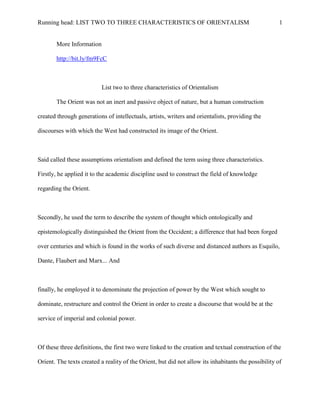
Orientalism's Three Characteristics
- 1. More Information <br />http://bit.ly/fm9FcC<br />List two to three characteristics of Orientalism<br />The Orient was not an inert and passive object of nature, but a human construction created through generations of intellectuals, artists, writers and orientalists, providing the discourses with which the West had constructed its image of the Orient.Said called these assumptions orientalism and defined the term using three characteristics. Firstly, he applied it to the academic discipline used to construct the field of knowledge regarding the Orient. Secondly, he used the term to describe the system of thought which ontologically and epistemologically distinguished the Orient from the Occident; a difference that had been forged over centuries and which is found in the works of such diverse and distanced authors as Esquilo, Dante, Flaubert and Marx... And finally, he employed it to denominate the projection of power by the West which sought to dominate, restructure and control the Orient in order to create a discourse that would be at the service of imperial and colonial power.Of these three definitions, the first two were linked to the creation and textual construction of the Orient. The texts created a reality of the Orient, but did not allow its inhabitants the possibility of expression. The European textural representations were offered as forms with which the Orient was made to speak, but without granting it a voice. That is to say, through foreign and exterior discourses which obviated self-representation of the East. In this way, these texts went on to demonstrate the assumptions and doctrines of Europe itself, while at the same time they constituted the forms of the study of the Europeans, instead of representing the inhabitants of the Orient. For Said, the texts stood up as a source of other realities. Interweaved as they were in the vast network of relationships of the world – political, social, and cultural – they allowed an approximation and interpretation of many other situations (Said, 1983). He had drawn this consideration from the work of Foucault, one of the philosophers whom Said recognised as a source of his textual criticism. Foucault's work suggested how a determined cultural order could be studied from its discursive definitions, which are rife with habits, unwritten rules, and suppositions, and could therefore also be considered as sources of social knowledge.<br />More Information <br />http://bit.ly/fm9FcC<br />